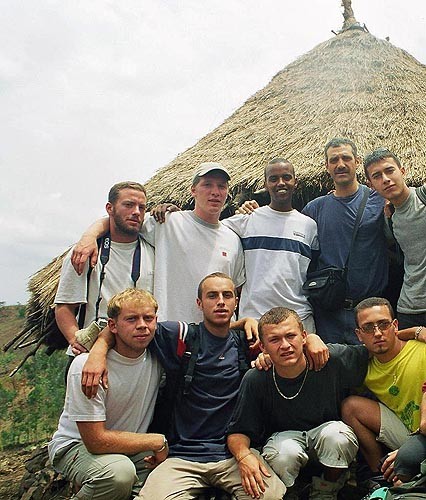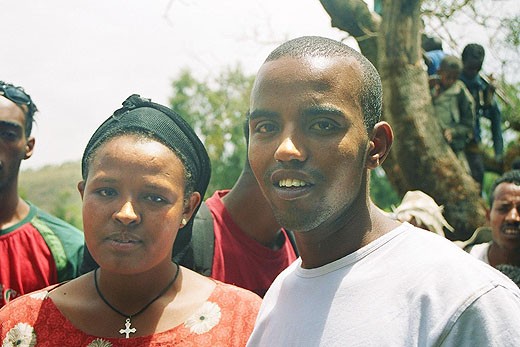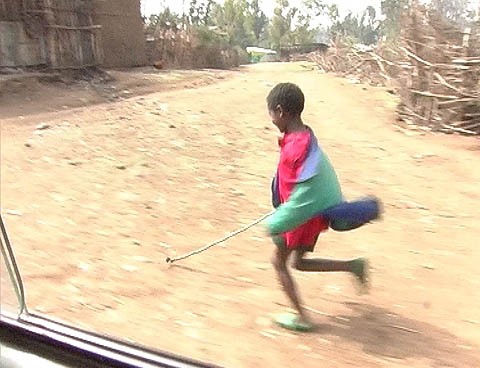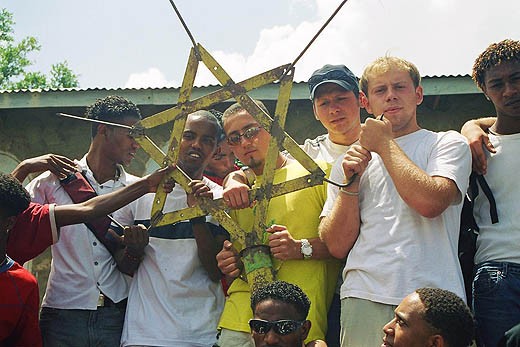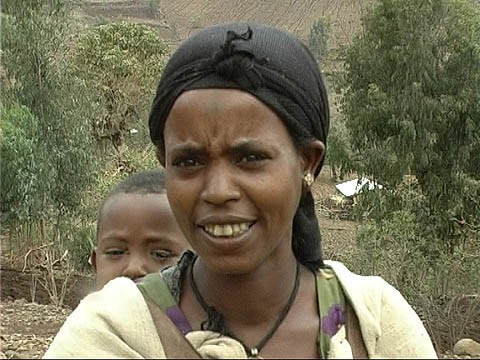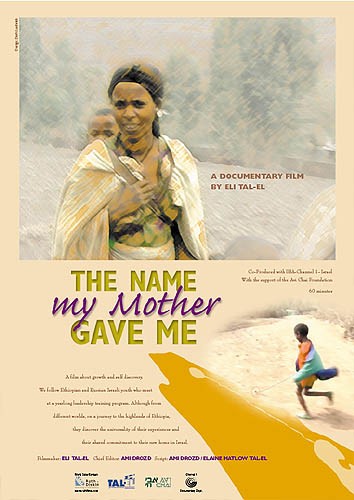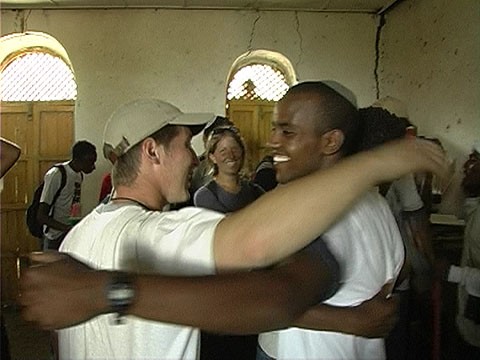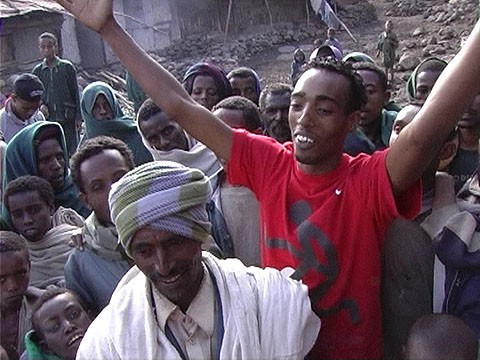"The Name My Mother Gave Me" is a film about growth and self discovery. We follow Ethiopian and Russian Israelis who meet at a leadership training program in Israel. Their year of learning culminates in a journey to Ethiopia where the Ethiopian born participants return to their native villages and confront their roots. Though, back home in Israel, all the participants would consider themselves members of the fringes of Israeli society, in the highlands of the Ethiopian landscape they discover the universality of their experiences and their shared commitment to their new home in Israel. How will this journey transform them?
Synopsis
"The Name My Mother Gave Me" is a film about growth and self discovery. We follow Ethiopian and Russian Israelis who meet at a leadership training program in Israel. Their year of learning culminates in a journey to Ethiopia where the Ethiopian born participants return to their native villages and confront their roots. Though, back home in Israel, all the participants would consider themselves members of the fringes of Israeli society, in the highlands of the Ethiopian landscape they discover the universality of their experiences and their shared commitment to their new home in Israel. How will this journey transform them?
Awards
- Audience Choice - Chicago Festival of Israeli Cinema, USA, 2009
Festivals
- Rwanda International Film Festival, 2015
- East Bay Jewish Film Festival, USA, 2013
- Addis Ababa International Film Festival, Ethiopia, 2011
- Utopia JCC, USA, 2010
Press & Links:
Must See Movies & Documentaries article from the blog of MochaJuden:
…A beautifully crafted movie that, I for one, loved. It brought out all the emotions every immigrant feels when they live in Israel, and this particular film directed by Eli Tal-El was simply one the best I have seen….the title of the film is in fact the crux of the film. As we watch these young immigrants, cocky in the way Israeli kids are, with their Nike shoes and FOX clothes. These boys are longing to see and remember their roots. At the end of the film, Uri is shown as a fighting soldier in an Israeli paratroop regiment, comfortable in his own skin, but he feels now he wants his original Ethiopian name back. He is a proud Israeli, but is also aware of his ethnic background….the essence of the film to me was the scene when one of the boys remembered the Bet Knesset in his village and wondered if was still there….the boys enter the building and here "the miracle" cam about. The little building had been untouched since the Jews had left, and there inside, was a Magen David on the wall, and box of dusty Hebrew books. That's when the invisible walls and barriers came tumbling down. These boys hugged each other, cried and laughed together, not as members of a group, but as brothers. Integration at the highest level….we can only hope and pray that is feeling of brotherhood between ethnic peoples who immigrate to Israel will be easier for generations to come.
ESRAmagazine, January, 2010
Hillel of Greater Toronto had the pleasure of Screening the movie "The Name My Mother Gave Me" followed by a discussion with the director Eli Tal El. This was an outstanding evening! Students and community members were highly moved by the scenes and story. In search of our own identity it's an emotional experience to share other's search. Our students were truly inspired.
Thank you for this opportunity!Shirin Ezekiel- HayatDirector of Israel AffairsHillel of Greater Toronto, CanadaWe viewed "The Name My mother Gave Me" prior to the High Holidays. The idea of re-connecting to your past at this time of year was particularly powerful, but this is a film that can be shown at any time of the year. The personal stories and the relationships between the participants were beautifully shown and quite moving. Most amazing is the concept that Jews from such different backgrounds and experiences help make up the fabric of Israel. This is a wonderful film for any synagogue or community group to experience!Rabbi Steve KaneCongregation Sonsof IsraelBriarcliff Manor, NY"As the national director for educational instruction and professional development at Beit Yatziv in Beer Sheva, I am convinced that this is a film that all educational professionals –and especially principals need to see. THE NAME MY MOTHER GAVE ME is very moving and raises many questions and issues regarding identity, education and Israeli society."
Dr. Oded Avisar, National Director of Educational Development,
Beit Yatziv, Beer ShevaThe Name My Mother Gave Me
A group of Israeli adolescents—mostly Ethiopian with a handful of Russians—are taking a pre-Army trip to Ethiopia. The visits are personal: One boy goes to see his mother, from whom he’s been separated for 14 years; the group stops at an abandoned synagogue, which bolsters their feelings of Jewish authenticity; their native Amharic becomes more fluent. The trip helps the Ethiopians reconcile their Israeli and Ethiopian identities and makes them better accept their Ethiopian heritage. It also leads to greater amity and understanding between the Ethiopians and Russians.
http://www.hadassah.org/pageframe.asp?page=per_ hadassah%2Farchive%2F2009% 2F09_june%2Fbrief.asp§ion= news&header=per_had&size=60 —Z.S./Hadassah Magazine, June, 2009
"The Name My Mother Gave Me is a documentary (2008), directed by Eli Tal-El, about a group of Russian and Ethiopian youth in an Israeli leadership training program." For the entire review by Amy Kronish, check: www.israelfilm.blogspot.com
“The Name My Mother Gave Me” is a film that is hard to resist because of the rare combination of innocence and the honest desire to connect to something positive- of both the filmmaker and the films' heroes. The lack of "sophistication" is the films' strength, despite the seeming disdain for so-called
"propaganda films" that chart the transformation in the life and character of the refugee who arrives in Israel.
"The Name My Mother Gave Me" is a love story- a story of unconditional love. The story of the love of the new arrivals to the Land of Israel: the nature, the
vistas, the language, to their new cultural roots. This is a story of love and longing for the language and the culture left behind- a love that once
recognized, enables them to move forward in the new and demanding environment of contemporary Israel.
But the greatest love story is the secondary narrative with which the filmmaker does not meddle- it is the love story between the young generation of
Ethiopians and their friends from the former Soviet Union- from the Ukraine, from Moldavia, and Lithuania who are studying side by side and serving together
as soldiers in the Israel Army. This is a natural love story, free of preconceptions and divisions- a gentle weave of black and white that exists nowhere
else. This is the great hope of Israeli society and perhaps of the global community as well. This is what transforms Eli Tal-El's film into a universal,
moving, and important creation.
Eliezer Yaari, CEO The New Israel Fund
The film, "The Name My Mother Gave Me" surprised me. It is carefully crafted- with sensitivity and wisdom. The film portrays believable images full of
authentic emotion that touch the heart. The film raises many questions that leave us wanting to know more about the main characters. The transformation
experienced by all- the Ethiopians, the non- Ethiopians, the youngsters and the not so young is particularly powerful. As an educator, I felt that an amazing
foundation has been laid for approaching the most urgent issues facing the Ethiopian community such as the breakdown of the family, homesickness,
disconnectedness and loneliness.
The film is an excellent educational platform for confronting issues of Jewishness, blackness, whiteness, poverty- and everything in between. The ability of
the filmmaker to capture images and stories from a position of strength and not of weakness is remarkable.
Shula Mula, Chair, the Israeli Association for Ethiopian Jews
Educator, Reut School, Jerusalem
Homeward Bound/ Eetta Prince-Gibson, The Jerusalem Report, March 2009
Produced and directed by Jerusalem-base filmmaker Eli Tal-El and his wife, Elaine Matlow Tal-El, "The Name My Mother Gave Me" is a thoughtful, moving hour-long documentary that follows this group as they travel to Ethiopia and back to find their personal and collective identities.
For the entire review please see http://www.jpost.com/servlet/Satellite?cid=1236103151025&pagename=JPost%2FJPArticle%2FShowFull
I would like to congratulate you. The film that was broadcast yesterday on Channel 1 was so human, simple and showed reality without trying to make it
beautiful. You should all be blessed – all the people behind this wonderful project. Above all – thank you for the sanity that still exists in our wonderful country – and especially on television. Thanks again – and good luck in you future battles.
Perla Weinberg
Education Department, Kokav Yair
Thank you for telling me about the movie. One of the most exciting and touching movies I have ever seen. The essence of being a Jew in Israel and why we are here.
Gadi Lipiner
Founder and CEO, Braintact Ltd.
Memory Keeper
Israel Today, February 23, 2009
Eli Tal-El's film is the story of a group of youngsters from a training course who travel to Ethiopia together. Only about half of the group are from an Ethiopian background, but when they return from their journey, all of them feel like they belong to one big family – the family of Israel. "And you'd better watch out if you say that there are no Jews here" sums up the trip one if the participants who was born in Moscow.
So identity was found, the pride was restored and the group was drafted into the IDF. In the most moving scene of the film the director of the program sobs as he recalls the challenges of getting the program off the ground: "do you know how they were in the beginning? Russians over here and Ethiopians over there". It turns out that they needed to travel all the way to Africa in order to create a unified group – because what you see in Gondar is not what you see out of the window at the training center on the Israeli costal plain. In Africa the group was amazed by the natural beauty. One of them yell: "You're home man – there's no place like Ethiopia". After returning to the villages of their birth, meeting relatives and imagining life in an Ethiopian village, the youngsters realize that their real home lies somewhere else. Many prayers and tears later, they return to that home. Uri Ayalon even reverts to his former-and original name- Gasua, while his Israeli identity is in tact. And the triumph belongs wholly to the director of the film Eli Tal-El.Festivals
- Rwanda International Film Festival, 2015
- East Bay Jewish Film Festival, USA, 2013
- Addis Ababa International Film Festival, Ethiopia, 2011
- Utopia JCC, USA, 2010
- Sao Paulo Israeli Film Festival, Brazil, 2010
- Ezra Film Club, Netanya, Israel
- Huntington Arts Centre, NY, USA, 2010
- St. Louis Jewish Film Festival, USA, 2010
- Phoenix International Film Festival, USA, 2010
- Detroit Jewish Film Festival, USA, 2010
- Cherry Hill Volvo Jewish Film Festival, USA, 2010
- Beit Avichai, Jerusalem, 2010
- India Int'l Women Film Festival, Special Showcase for Ruth Diskin Films, December 2009
- San Diego Jewish Film Festival, USA, 2010
- Philadelphia Israeli Film Festival, USA, 2010
- Manhattan JCC, NY, 2010
- Hillel at Greater Toronto, Canada, 2009
- Habonim Congregation, Toronto, 2009
- Washington Jewish Film Festival, USA, 2009
- Hadassah Wizo, Canada, 2009
- Hakhel Festival, Israel, 2009
- Hartman Institute, Israel
- Chicago Festival of Israeli Cinema, USA, 2009
- Jewish Federations of North America's Special Screening – NYC, USA, 2009
- The Jerusalem Jewish Film Festival, Israel, 2008
Educational
- University of Houston
- Shomrei Hadath Synagogue, UK
- Hamilton College
- Tulane University
- Smith College
- Hebrew University
- Rockland JCC Library
- McGill University
- Baruch College
- Baltimore Center for Jewish Education
- Ezra Film Club, Israel
- Colgate University
- Duke University
- University of Denver
- Ohio State University
- UCLA
- George Town University
- Milwaukee Jewish Resource Center
- URJ Summer Camps, USA
- Hebrew Academy, Rockville
- Maryland University
- Library of Congress
- University of Pennsylvania
- Arizona State University
- Harvard University
- Pardes Institute, Israel
- Hebrew Union College, Israel
- Michigan State University
- University of Kansas
- Montreal Jewish Public Library
- Beit Yatziv, Israel
- Temple Sinai Library
- Hebrew University
- Ashkelon Academic College, Israel
- Kay College, Israel
- UJC, Israel
- Joint Pact Beit Shemesh, Israel
- Joint Pact Kiriyat Gat, Israel
- NY Federation
- Temple Sinai Library, L.A
- IDF – Nativ Project
- Oranim College , Israel
- Hebrew University
- Herzog Center, Israel
- Hebrew Union College, Jerusalem
- Kibbutz Yad Mordechai, Israel
- Pre-Military Training Course, Jaffa, Israel
- Sedot Yam Community Center, Israel
- Beit Shemesh Community Center, Israel
- Eldad High School, Netanya
- Shalom Congregation, Kibutz Gezer, Israel
Awards
- Audience Choice - Chicago Festival of Israeli Cinema, USA, 2009
© 2021 Ruth Films. All Rights Reserved.
